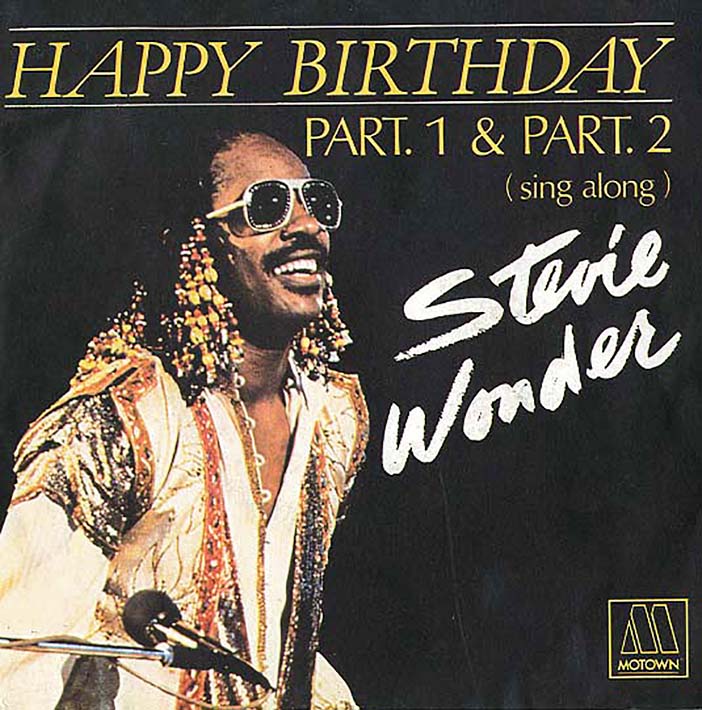Stevie Wonder’s Reworking of “Happy Birthday”
Stevie Wonder’s “Happy Birthday” song offers a great example of how to recontextualize music. That it also provides a model for infusing a serious message with a light-hearted ditty is even better.
Singing Stevie Wonder’s “Happy Birthday,” with the pulsing, rhythmic refrain: happy birthday to you, happy birthday to you, happy birthday…, has been a black American tradition at birthday parties since the early ‘80s. But the tradition of singing the “Happy Birthday To You” song to the birthday person dates back farther to 1893. Written by Patty and Mildred J. Hill, two white American sisters and kindergarten teachers from Louisville, KY, “Happy Birthday to You,” or simply “Happy Birthday,” was sung everywhere in America for the marking of the anniversary of someone’s birthday. This celebratory tradition had grown so strong around the world that by the middle of the twentieth-century, it was already the most popular song in the English language. But the “Happy Birthday” song holds far greater significance than it’s sheer popularity.
In an unbearably long and dark period in America, where overt racism and legalized segregation (a legacy of slavery), governed the day, the “Happy Birthday” song was one of very few cultural traditions that was integrated. In black and white homes alike, the “Happy Birthday” song was the song that family and friends turned to mark the anniversary of the birth of someone dear to them. This simple but enduring lyric required no music or any special singing skills. Anyone could croon out the “Happy Birthday” song and make it sound great. If you happened to be the person at the center of the celebration, it sounded magnificent no matter who was singing it to you.
In 1980, nearly 90 years after the birth of the Hill sister’s “Happy Birthday,” Stevie Wonder released Hotter Than July, at that time his biggest selling album to date. Among the many hit singles on the album was the gem “Happy Birthday.” During this time, Stevie was one of the key figures of the campaign to make Martin Luther King, Jr.’s birthday a national holiday in America. As a means for drawing more attention and energy to the cause, Stevie reworked an old American tradition into a pop song. In effect, he transformed the “Happy Birthday” song into a black mainstay and global celebration of Martin Luther King, Jr.:
You know it doesn’t make much sense
There ought to be a law against
Anyone who takes offense
At a day in your celebration
‘Cause we all know in our minds
That there ought to be a time
That we can set aside
To show just how much we love you
Stevie Wonder’s “Happy Birthday” wasn’t all message alone; musically, it was a bop! Most people who’ve sung the Hill sister’s version of “Happy Birthday” have done so a cappella; musical accompaniment wasn’t needed because it was designed only for some light piano work. So on the face of it, this reconceptualizing and reworking of a great American classic seems unbelievable. Nonetheless, drawing on his influence from Bob Marley and African-based musics of the time, Stevie created a soulful, upbeat arrangement that reconfigured the idea of the “Happy Birthday” song into an uplifting cry for federal recognition of one the world’s greatest humanitarians and just plain old fashion fun.
On November 2, 1983, the Martin Luther King, Jr. Day holiday was signed into existence by President Ronald Reagan. As a pre-teen growing up listening to and singing along with Stevie Wonder’s “Happy Birthday,” the underscoring significance and magnitude was nearly lost on me. I had recognized the fact that, for many black Americans at least, Stevie Wonder’s “Happy Birthday” had replaced one tradition with another. With its intuitively celebratory rhythm and soulful rephrasing of the main refrain of happy birthday, one could easily understand how and why it displaced the Hill sister’s original rendition. But it was the full impact and underlying power that Stevie’s “Happy Birthday” was able to provide, in addition to its get-up-and-boogie style quality, that stuck with me the most.
Birthday party memories of punch, drunk uncles and aunts (and my uncles and aunts who didn’t drink fuming about my drunk uncles and aunts) and my cousins and me dancing, running around, and fighting to the death still dart through my mind. But when I think about all of the fun and cheer that Stevie Wonder’s “Happy Birthday” provided as background music (the song would be ran back multiple times at each party), I can only smile at how he was able to make “Happy Birthday” a message song.
Happy Birthday to you, Stevie, happy birthday…
The music and video below is presented here for the purpose of scholarship.
Stevie Wonder – “Happy Birthday”
